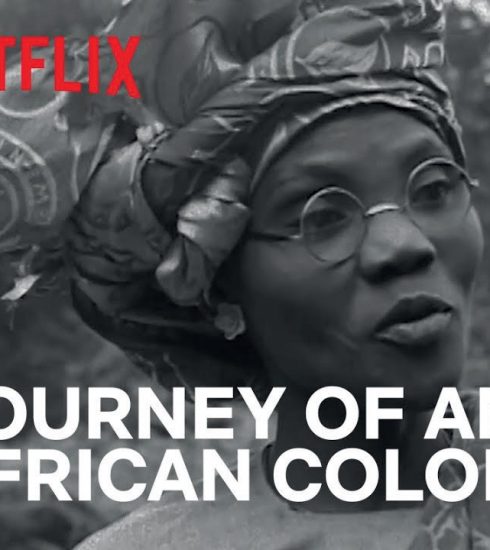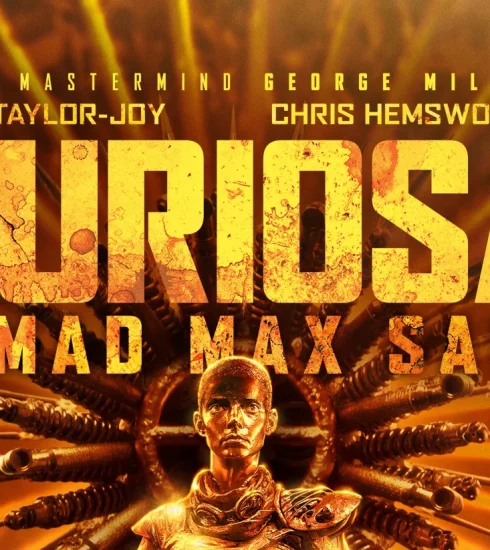Watch Of The Week: All Quiet On The Western Front
-
Boluwatife Adesina

- March 4, 2023
You may feel that you need another brutal battlefield movie like you need a hole in the head, and it would be a lie to say that there’s anything remotely breezy about spending nearly two-and-a-half hours immersed in All Quiet on the Western Front. Much like 1917 or Saving Private Ryan, though, this sprawling German-language adaptation of Erich Maria Remarque’s classic WWI novel is a film that feels both aesthetically dazzling and full of necessary truths: an antiwar drama that transcends the bombast of propaganda mostly just because it’s so artfully and indelibly made.
Felix Kammerer is Paul Bäumer, a German teenage recruit thrilled to be going where the action is; within weeks, they’ll take Paris, a local ensures him and his eager friends, and return to the Motherland as heroes. Instead, of course, it’s a waking nightmare: a scorched existence that toggles between abject tedium and annihilating violence for months and then years on end. But there’s also a bone-deep camaraderie that blossoms in the trenches, not just between Paul and his fellow schoolmate recruits but with more hardened soldiers like Kat (Albrecht Schuch) — a veteran with a knack for team-building and stealing geese (to these starving, freezing boys, one heisted bird is a feast).
There are also interspersed scenes of the Axis commanders controlling it all: well-fed, walrus-moustachioed men who gather around warm fires with their wine and cheese, whimsically deciding the fates of millions. Director Edward Berger isn’t exactly subtle with those contrasts, but he draws lovely, painfully intimate performances from his tender young cast (along with more familiar faces like MCU star Daniel Brühl, as a rare back-office operator with a conscience); the spectral score by composer Volker Bertelmann is gorgeously unsettling, and the cinematography achieves a kind of painterly, panoramic grandeur. Western Front is hardly the first movie to show us on a grand scale that war is hell — in fact; it’s been more than 80 years since the original 1930 screen version took home two Oscars, including Best Picture — and certainly not the last. But it tells it profoundly and often heartbreakingly well.
Boluwatife Adesina is a media writer and the helmer of the Downtown Review page. He’s probably in a cinema near you.
- Boluwatife Adesina
- Boluwatife Adesina
- Boluwatife Adesina
- Boluwatife Adesina
- Boluwatife Adesina
- Boluwatife Adesina
- Boluwatife Adesina
- Boluwatife Adesina
- Boluwatife Adesina
- Boluwatife Adesina
- Boluwatife Adesina
- Boluwatife Adesina
- Boluwatife Adesina
- Boluwatife Adesina
- Boluwatife Adesina
- Boluwatife Adesina
- Boluwatife Adesina
- Boluwatife Adesina
- Boluwatife Adesina
- Boluwatife Adesina
- Boluwatife Adesina
- Boluwatife Adesina
- Boluwatife Adesina
- Boluwatife Adesina
- Boluwatife Adesina
- Boluwatife Adesina
- Boluwatife Adesina
- Boluwatife Adesina
- Boluwatife Adesina
- Boluwatife Adesina
- Boluwatife Adesina
- Boluwatife Adesina
- Boluwatife Adesina
- Boluwatife Adesina
- Boluwatife Adesina
- Boluwatife Adesina
- Boluwatife Adesina
- Boluwatife Adesina
- Boluwatife Adesina
- Boluwatife Adesina
- Boluwatife Adesina
- Boluwatife Adesina
- Boluwatife Adesina
- Boluwatife Adesina
- Boluwatife Adesina
- Boluwatife Adesina
- Boluwatife Adesina
- Boluwatife Adesina
- Boluwatife Adesina
- Boluwatife Adesina
- Boluwatife Adesina
- Boluwatife Adesina
- Boluwatife Adesina
- Boluwatife Adesina
- Boluwatife Adesina
- Boluwatife Adesina
- Boluwatife Adesina
- Boluwatife Adesina
- Boluwatife Adesina
- Boluwatife Adesina
- Boluwatife Adesina
- Boluwatife Adesina
- Boluwatife Adesina
- Boluwatife Adesina
- Boluwatife Adesina
- Boluwatife Adesina
- Boluwatife Adesina
- Boluwatife Adesina
- Boluwatife Adesina
- Boluwatife Adesina
- Boluwatife Adesina
- Boluwatife Adesina
- Boluwatife Adesina
- Boluwatife Adesina
- Boluwatife Adesina
- Boluwatife Adesina
- Boluwatife Adesina
- Boluwatife Adesina
- Boluwatife Adesina
- Boluwatife Adesina
- Boluwatife Adesina
- Boluwatife Adesina
- Boluwatife Adesina
- Boluwatife Adesina
- Boluwatife Adesina
- Boluwatife Adesina
- Boluwatife Adesina
- Boluwatife Adesina
- Boluwatife Adesina
- Boluwatife Adesina
- Boluwatife Adesina
- Boluwatife Adesina
- Boluwatife Adesina
- Boluwatife Adesina
- Boluwatife Adesina
- Boluwatife Adesina
- Boluwatife Adesina
- Boluwatife Adesina
- Boluwatife Adesina
- Boluwatife Adesina
- Boluwatife Adesina
- Boluwatife Adesina
- Boluwatife Adesina
- Boluwatife Adesina
- Boluwatife Adesina
- Boluwatife Adesina
- Boluwatife Adesina
- Boluwatife Adesina
- Boluwatife Adesina
- Boluwatife Adesina
- Boluwatife Adesina
- Boluwatife Adesina
- Boluwatife Adesina
- Boluwatife Adesina
- Boluwatife Adesina
- Boluwatife Adesina
- Boluwatife Adesina
- Boluwatife Adesina
- Boluwatife Adesina
- Boluwatife Adesina
- Boluwatife Adesina
- Boluwatife Adesina
- Boluwatife Adesina
- Boluwatife Adesina
- Boluwatife Adesina
- Boluwatife Adesina
- Boluwatife Adesina
- Boluwatife Adesina
- Boluwatife Adesina
- Boluwatife Adesina
- Boluwatife Adesina
- Boluwatife Adesina
- Boluwatife Adesina
- Boluwatife Adesina
- Boluwatife Adesina
- Boluwatife Adesina
- Boluwatife Adesina
- Boluwatife Adesina
- Boluwatife Adesina
- Boluwatife Adesina
- Boluwatife Adesina
- Boluwatife Adesina
- Boluwatife Adesina
- Boluwatife Adesina
- Boluwatife Adesina
- Boluwatife Adesina
- Boluwatife Adesina
- Boluwatife Adesina
- Boluwatife Adesina
- Boluwatife Adesina
- Boluwatife Adesina
- Boluwatife Adesina
- Boluwatife Adesina
- Boluwatife Adesina
- Boluwatife Adesina
- Boluwatife Adesina
- Boluwatife Adesina
- Boluwatife Adesina
- Boluwatife Adesina
- Boluwatife Adesina
- Boluwatife Adesina
- Boluwatife Adesina
- Boluwatife Adesina
- Boluwatife Adesina
- Boluwatife Adesina
- Boluwatife Adesina
- Boluwatife Adesina
- Boluwatife Adesina
- Boluwatife Adesina
- Boluwatife Adesina
- Boluwatife Adesina
- Boluwatife Adesina
- Boluwatife Adesina
- Boluwatife Adesina
- Boluwatife Adesina
- Boluwatife Adesina
- Boluwatife Adesina
- Boluwatife Adesina
- Boluwatife Adesina
- Boluwatife Adesina
- Boluwatife Adesina
- Boluwatife Adesina
- Boluwatife Adesina
- Boluwatife Adesina
- Boluwatife Adesina
- Boluwatife Adesina
- Boluwatife Adesina
- Boluwatife Adesina
- Boluwatife Adesina
- Boluwatife Adesina
- Boluwatife Adesina
- Boluwatife Adesina
- Boluwatife Adesina
- Boluwatife Adesina
- Boluwatife Adesina
- Boluwatife Adesina
- Boluwatife Adesina
- Boluwatife Adesina
- Boluwatife Adesina
- Boluwatife Adesina
- Boluwatife Adesina
- Boluwatife Adesina
- Boluwatife Adesina
- Boluwatife Adesina
- Boluwatife Adesina
- Boluwatife Adesina
- Boluwatife Adesina
- Boluwatife Adesina
- Boluwatife Adesina
- Boluwatife Adesina
- Boluwatife Adesina
- Boluwatife Adesina
- Boluwatife Adesina
- Boluwatife Adesina
- Boluwatife Adesina
- Boluwatife Adesina
- Boluwatife Adesina
- Boluwatife Adesina
- Boluwatife Adesina
- Boluwatife Adesina
- Boluwatife Adesina
- Boluwatife Adesina
- Boluwatife Adesina
- Boluwatife Adesina
- Boluwatife Adesina
- Boluwatife Adesina
- Boluwatife Adesina
- Boluwatife Adesina
- Boluwatife Adesina
- Boluwatife Adesina
- Boluwatife Adesina
- Boluwatife Adesina
- Boluwatife Adesina
- Boluwatife Adesina
- Boluwatife Adesina
- Boluwatife Adesina
- Boluwatife Adesina
- Boluwatife Adesina
- Boluwatife Adesina
- Boluwatife Adesina
- Boluwatife Adesina
- Boluwatife Adesina
- Boluwatife Adesina
- Boluwatife Adesina
- Boluwatife Adesina
- Boluwatife Adesina
- Boluwatife Adesina
- Boluwatife Adesina
- Boluwatife Adesina
- Boluwatife Adesina
- Boluwatife Adesina
- Boluwatife Adesina
- Boluwatife Adesina
- Boluwatife Adesina
- Boluwatife Adesina
- Boluwatife Adesina
- Boluwatife Adesina
- Boluwatife Adesina
- Boluwatife Adesina
- Boluwatife Adesina
- Boluwatife Adesina
- Boluwatife Adesina
- Boluwatife Adesina
- Boluwatife Adesina
- Boluwatife Adesina
- Boluwatife Adesina
- Boluwatife Adesina
- Boluwatife Adesina
- Boluwatife Adesina
- Boluwatife Adesina
- Boluwatife Adesina
- Boluwatife Adesina
- Boluwatife Adesina
- Boluwatife Adesina
- Boluwatife Adesina
- Boluwatife Adesina
- Boluwatife Adesina
- Boluwatife Adesina
- Boluwatife Adesina
- Boluwatife Adesina
- Boluwatife Adesina
- Boluwatife Adesina
- Boluwatife Adesina
- Boluwatife Adesina
- Boluwatife Adesina
- Boluwatife Adesina
- Boluwatife Adesina
- Boluwatife Adesina
- Boluwatife Adesina
- Boluwatife Adesina
- Boluwatife Adesina
- Boluwatife Adesina
- Boluwatife Adesina
- Boluwatife Adesina
- Boluwatife Adesina
- Boluwatife Adesina
- Boluwatife Adesina
- Boluwatife Adesina
- Boluwatife Adesina
- Boluwatife Adesina
- Boluwatife Adesina
- Boluwatife Adesina
- Boluwatife Adesina
- Boluwatife Adesina
- Boluwatife Adesina
- Boluwatife Adesina
- Boluwatife Adesina
- Boluwatife Adesina
- Boluwatife Adesina
- Boluwatife Adesina
- Boluwatife Adesina
- Boluwatife Adesina
- Boluwatife Adesina
- Boluwatife Adesina
- Boluwatife Adesina
- Boluwatife Adesina
- Boluwatife Adesina
- Boluwatife Adesina
- Boluwatife Adesina
- Boluwatife Adesina
- Boluwatife Adesina
- Boluwatife Adesina
- Boluwatife Adesina
- Boluwatife Adesina
- Boluwatife Adesina
- Boluwatife Adesina
- Boluwatife Adesina
- Boluwatife Adesina
- Boluwatife Adesina
- Boluwatife Adesina
- Boluwatife Adesina
- Boluwatife Adesina
- Boluwatife Adesina
- Boluwatife Adesina
- Boluwatife Adesina
- Boluwatife Adesina
- Boluwatife Adesina
- Boluwatife Adesina
- Boluwatife Adesina
- Boluwatife Adesina
- Boluwatife Adesina
- Boluwatife Adesina
- Boluwatife Adesina
- Boluwatife Adesina
- Boluwatife Adesina
- Boluwatife Adesina
- Boluwatife Adesina
- Boluwatife Adesina
- Boluwatife Adesina
- Boluwatife Adesina
- Boluwatife Adesina
- Boluwatife Adesina
- Boluwatife Adesina
- Boluwatife Adesina
- Boluwatife Adesina
- Boluwatife Adesina
- Boluwatife Adesina
- Boluwatife Adesina
- Boluwatife Adesina
- Boluwatife Adesina
- Boluwatife Adesina
- Boluwatife Adesina
- Boluwatife Adesina
- Boluwatife Adesina
- Boluwatife Adesina
- Boluwatife Adesina
- Boluwatife Adesina
- Boluwatife Adesina
- Boluwatife Adesina
- Boluwatife Adesina
- Boluwatife Adesina
- Boluwatife Adesina
- Boluwatife Adesina
- Boluwatife Adesina
- Boluwatife Adesina
- Boluwatife Adesina
- Boluwatife Adesina
- Boluwatife Adesina
- Boluwatife Adesina
- Boluwatife Adesina
- Boluwatife Adesina
- Boluwatife Adesina
- Boluwatife Adesina
- Boluwatife Adesina
- Boluwatife Adesina
- Boluwatife Adesina
- Boluwatife Adesina
- Boluwatife Adesina
About Author / Boluwatife Adesina
Boluwatife Adesina is a media writer and the helmer of the Downtown Review page. He’s probably in a cinema near you.






